Contemporary Hospitality Industry: Departments, Skills, and Gaps
VerifiedAdded on 2020/12/10
|9
|2032
|255
Report
AI Summary
This report provides a detailed analysis of the contemporary hospitality industry, focusing on the operational and functional departments within the sector, using Sheraton Hotels and Resorts as a case study. It examines various departments, including the front office, housekeeping, food and beverage, accounting, human resources, and security, highlighting their interrelationships and contributions. The report investigates different operational roles such as receptionists, hotel general managers, front desk supervisors, and executive chefs, outlining the required skills for each position. A significant portion of the report is dedicated to identifying skills gaps and shortages, primarily due to advancements in technology, and analyzes how these gaps negatively impact the business, such as hindering communication and problem-solving abilities. The report concludes by suggesting strategies to mitigate these issues, such as providing training and development programs to enhance employee skills, ultimately aiming to improve the overall performance and success of hospitality businesses.
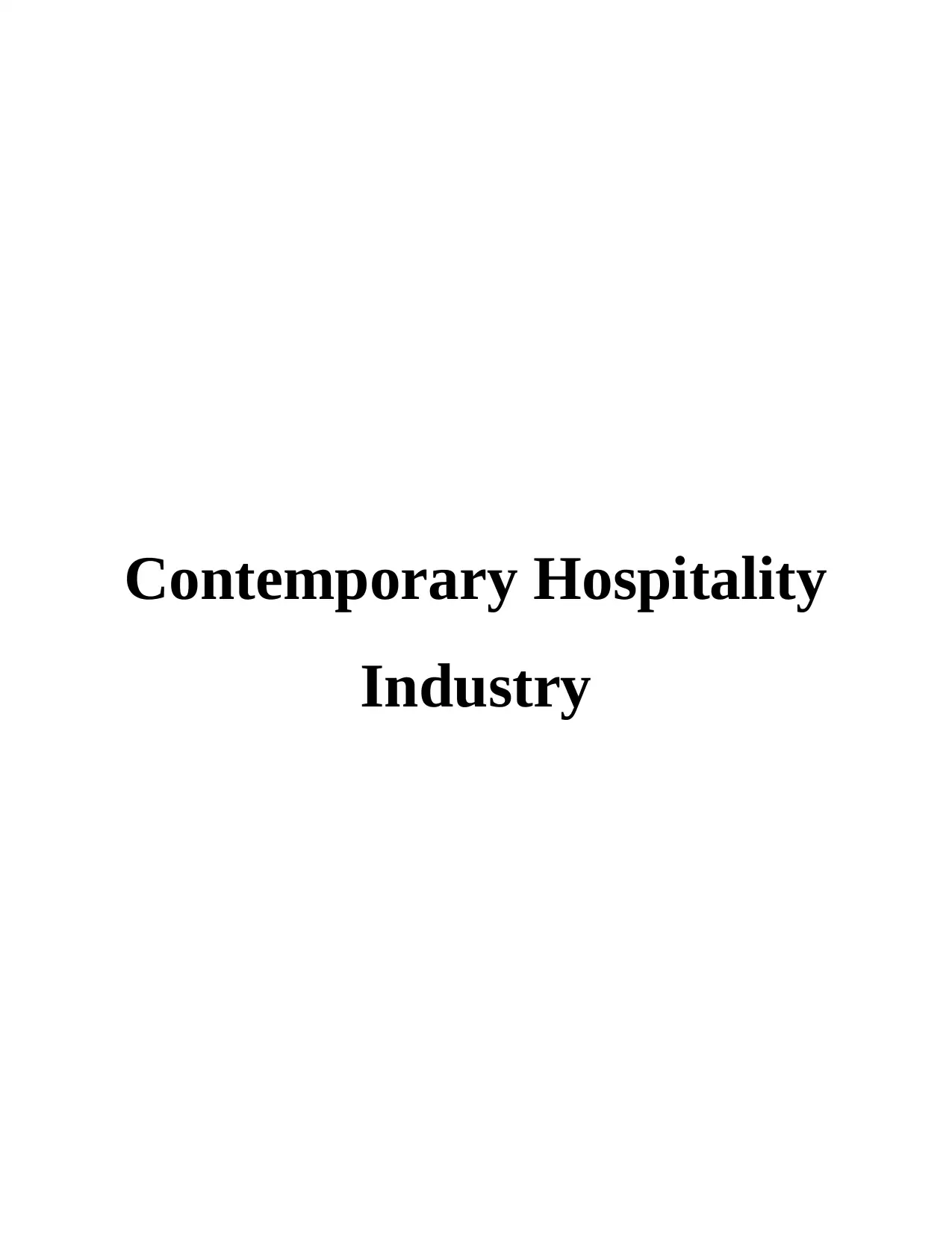
Contemporary Hospitality
Industry
Industry
Paraphrase This Document
Need a fresh take? Get an instant paraphrase of this document with our AI Paraphraser
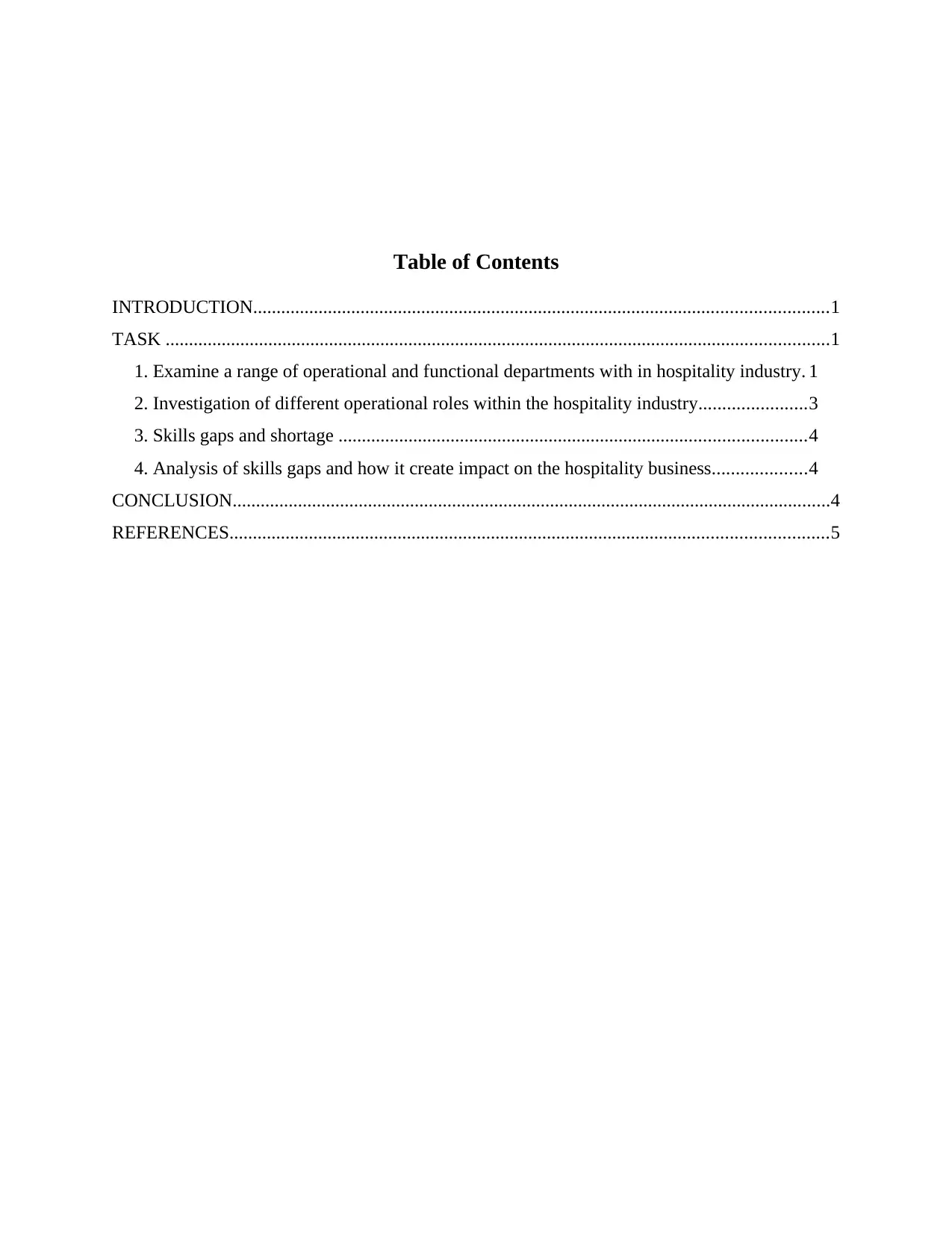
Table of Contents
INTRODUCTION...........................................................................................................................1
TASK ..............................................................................................................................................1
1. Examine a range of operational and functional departments with in hospitality industry. 1
2. Investigation of different operational roles within the hospitality industry.......................3
3. Skills gaps and shortage ....................................................................................................4
4. Analysis of skills gaps and how it create impact on the hospitality business....................4
CONCLUSION................................................................................................................................4
REFERENCES................................................................................................................................5
INTRODUCTION...........................................................................................................................1
TASK ..............................................................................................................................................1
1. Examine a range of operational and functional departments with in hospitality industry. 1
2. Investigation of different operational roles within the hospitality industry.......................3
3. Skills gaps and shortage ....................................................................................................4
4. Analysis of skills gaps and how it create impact on the hospitality business....................4
CONCLUSION................................................................................................................................4
REFERENCES................................................................................................................................5
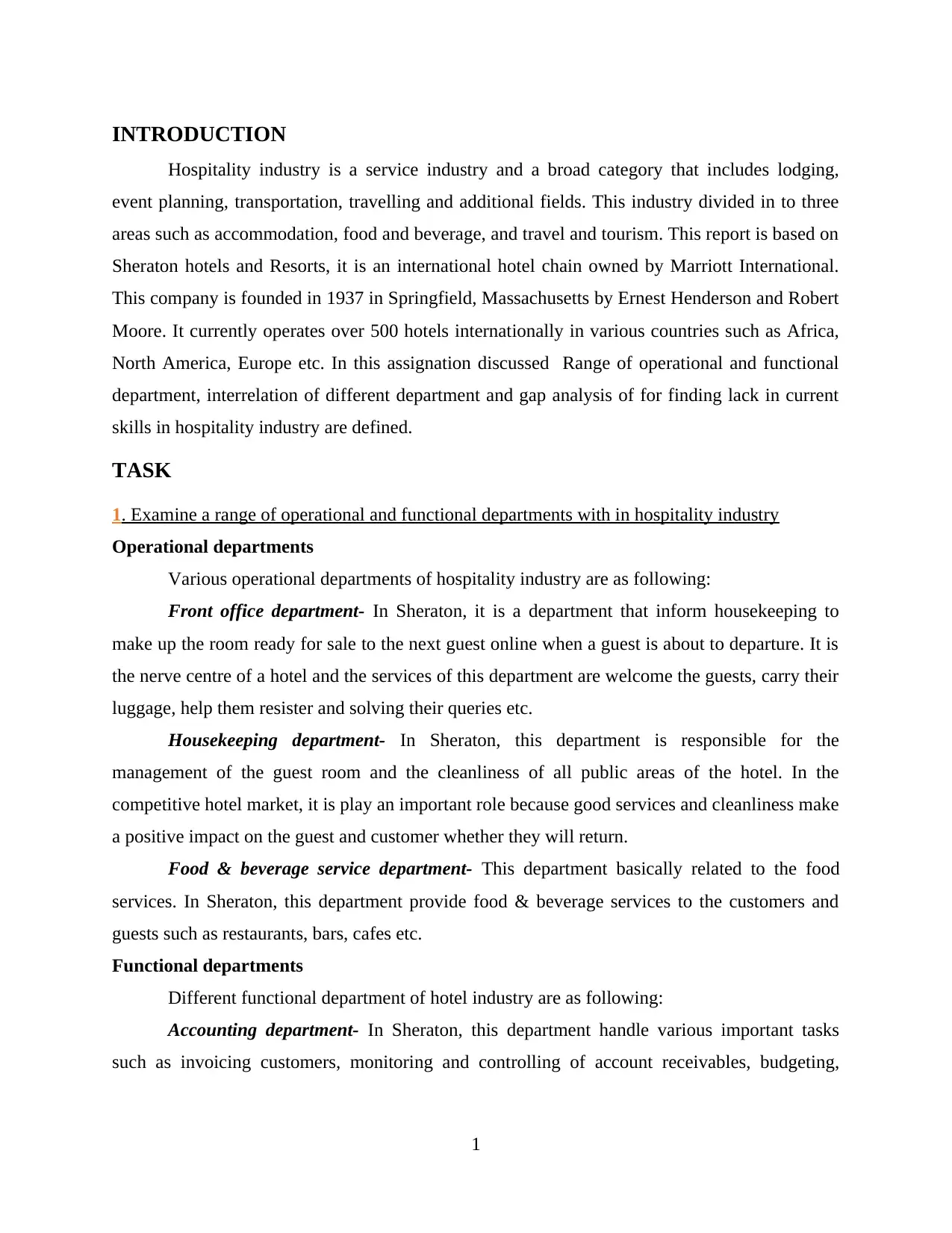
INTRODUCTION
Hospitality industry is a service industry and a broad category that includes lodging,
event planning, transportation, travelling and additional fields. This industry divided in to three
areas such as accommodation, food and beverage, and travel and tourism. This report is based on
Sheraton hotels and Resorts, it is an international hotel chain owned by Marriott International.
This company is founded in 1937 in Springfield, Massachusetts by Ernest Henderson and Robert
Moore. It currently operates over 500 hotels internationally in various countries such as Africa,
North America, Europe etc. In this assignation discussed Range of operational and functional
department, interrelation of different department and gap analysis of for finding lack in current
skills in hospitality industry are defined.
TASK
1. Examine a range of operational and functional departments with in hospitality industry
Operational departments
Various operational departments of hospitality industry are as following:
Front office department- In Sheraton, it is a department that inform housekeeping to
make up the room ready for sale to the next guest online when a guest is about to departure. It is
the nerve centre of a hotel and the services of this department are welcome the guests, carry their
luggage, help them resister and solving their queries etc.
Housekeeping department- In Sheraton, this department is responsible for the
management of the guest room and the cleanliness of all public areas of the hotel. In the
competitive hotel market, it is play an important role because good services and cleanliness make
a positive impact on the guest and customer whether they will return.
Food & beverage service department- This department basically related to the food
services. In Sheraton, this department provide food & beverage services to the customers and
guests such as restaurants, bars, cafes etc.
Functional departments
Different functional department of hotel industry are as following:
Accounting department- In Sheraton, this department handle various important tasks
such as invoicing customers, monitoring and controlling of account receivables, budgeting,
1
Hospitality industry is a service industry and a broad category that includes lodging,
event planning, transportation, travelling and additional fields. This industry divided in to three
areas such as accommodation, food and beverage, and travel and tourism. This report is based on
Sheraton hotels and Resorts, it is an international hotel chain owned by Marriott International.
This company is founded in 1937 in Springfield, Massachusetts by Ernest Henderson and Robert
Moore. It currently operates over 500 hotels internationally in various countries such as Africa,
North America, Europe etc. In this assignation discussed Range of operational and functional
department, interrelation of different department and gap analysis of for finding lack in current
skills in hospitality industry are defined.
TASK
1. Examine a range of operational and functional departments with in hospitality industry
Operational departments
Various operational departments of hospitality industry are as following:
Front office department- In Sheraton, it is a department that inform housekeeping to
make up the room ready for sale to the next guest online when a guest is about to departure. It is
the nerve centre of a hotel and the services of this department are welcome the guests, carry their
luggage, help them resister and solving their queries etc.
Housekeeping department- In Sheraton, this department is responsible for the
management of the guest room and the cleanliness of all public areas of the hotel. In the
competitive hotel market, it is play an important role because good services and cleanliness make
a positive impact on the guest and customer whether they will return.
Food & beverage service department- This department basically related to the food
services. In Sheraton, this department provide food & beverage services to the customers and
guests such as restaurants, bars, cafes etc.
Functional departments
Different functional department of hotel industry are as following:
Accounting department- In Sheraton, this department handle various important tasks
such as invoicing customers, monitoring and controlling of account receivables, budgeting,
1
⊘ This is a preview!⊘
Do you want full access?
Subscribe today to unlock all pages.

Trusted by 1+ million students worldwide
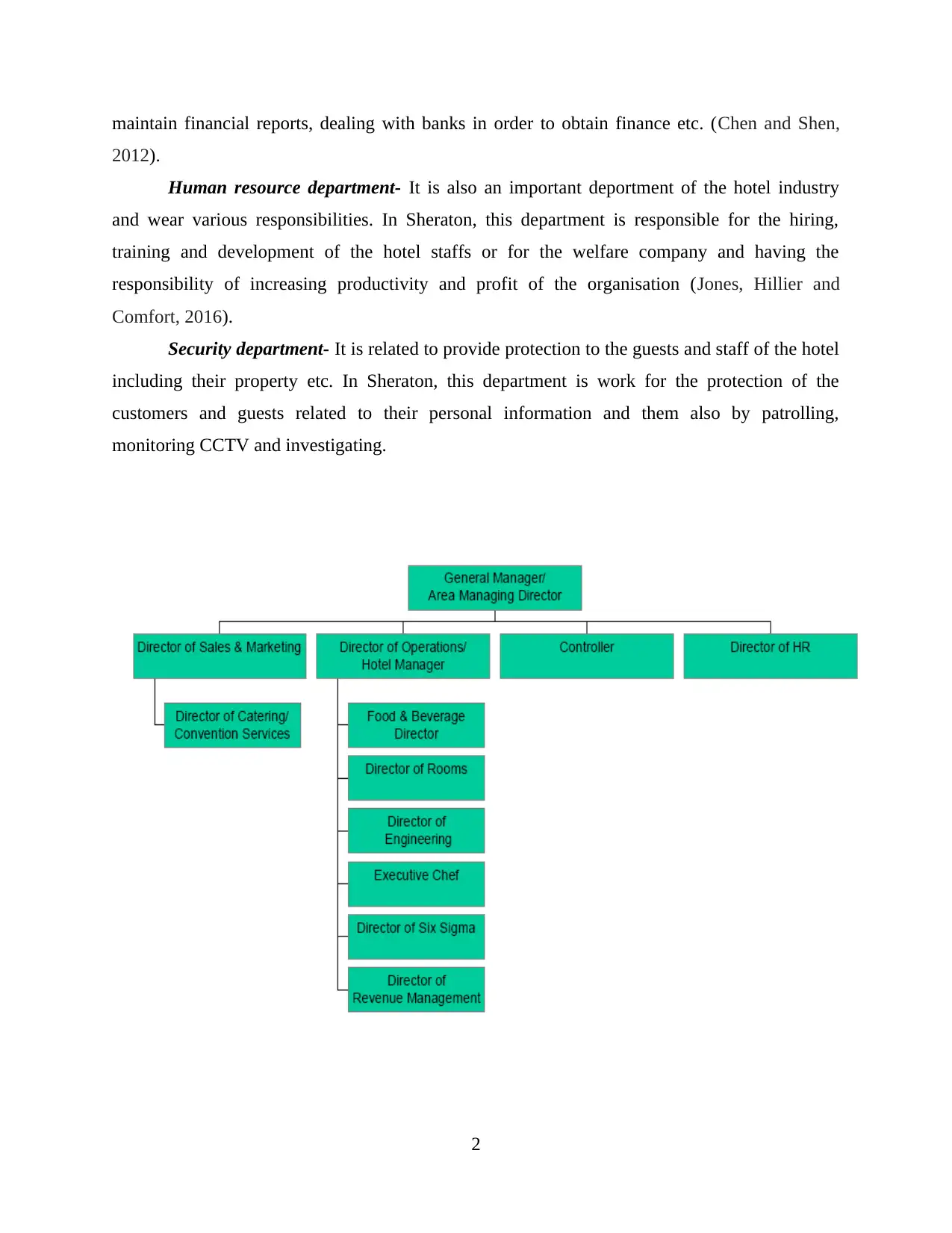
maintain financial reports, dealing with banks in order to obtain finance etc. (Chen and Shen,
2012).
Human resource department- It is also an important deportment of the hotel industry
and wear various responsibilities. In Sheraton, this department is responsible for the hiring,
training and development of the hotel staffs or for the welfare company and having the
responsibility of increasing productivity and profit of the organisation (Jones, Hillier and
Comfort, 2016).
Security department- It is related to provide protection to the guests and staff of the hotel
including their property etc. In Sheraton, this department is work for the protection of the
customers and guests related to their personal information and them also by patrolling,
monitoring CCTV and investigating.
2
2012).
Human resource department- It is also an important deportment of the hotel industry
and wear various responsibilities. In Sheraton, this department is responsible for the hiring,
training and development of the hotel staffs or for the welfare company and having the
responsibility of increasing productivity and profit of the organisation (Jones, Hillier and
Comfort, 2016).
Security department- It is related to provide protection to the guests and staff of the hotel
including their property etc. In Sheraton, this department is work for the protection of the
customers and guests related to their personal information and them also by patrolling,
monitoring CCTV and investigating.
2
Paraphrase This Document
Need a fresh take? Get an instant paraphrase of this document with our AI Paraphraser
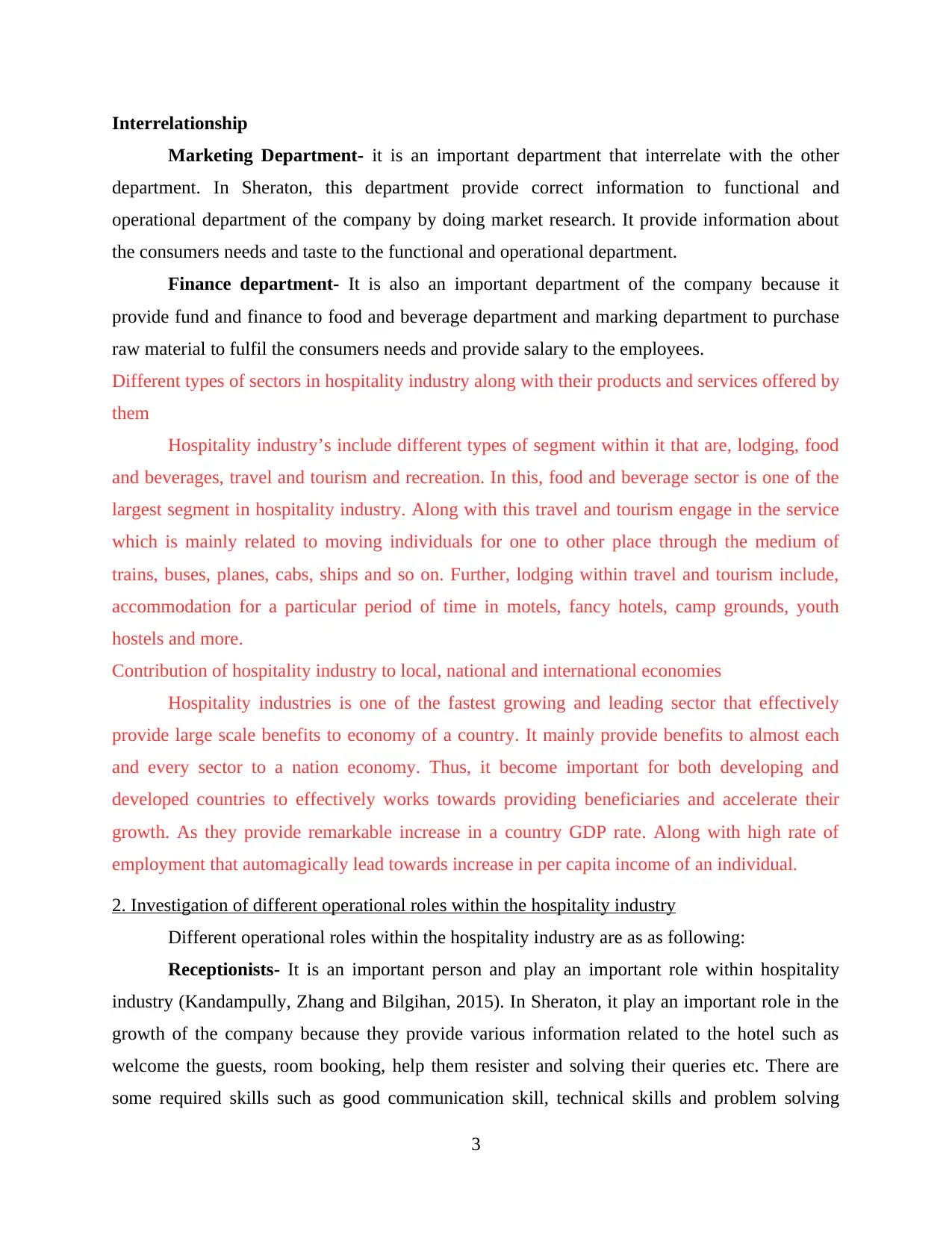
Interrelationship
Marketing Department- it is an important department that interrelate with the other
department. In Sheraton, this department provide correct information to functional and
operational department of the company by doing market research. It provide information about
the consumers needs and taste to the functional and operational department.
Finance department- It is also an important department of the company because it
provide fund and finance to food and beverage department and marking department to purchase
raw material to fulfil the consumers needs and provide salary to the employees.
Different types of sectors in hospitality industry along with their products and services offered by
them
Hospitality industry’s include different types of segment within it that are, lodging, food
and beverages, travel and tourism and recreation. In this, food and beverage sector is one of the
largest segment in hospitality industry. Along with this travel and tourism engage in the service
which is mainly related to moving individuals for one to other place through the medium of
trains, buses, planes, cabs, ships and so on. Further, lodging within travel and tourism include,
accommodation for a particular period of time in motels, fancy hotels, camp grounds, youth
hostels and more.
Contribution of hospitality industry to local, national and international economies
Hospitality industries is one of the fastest growing and leading sector that effectively
provide large scale benefits to economy of a country. It mainly provide benefits to almost each
and every sector to a nation economy. Thus, it become important for both developing and
developed countries to effectively works towards providing beneficiaries and accelerate their
growth. As they provide remarkable increase in a country GDP rate. Along with high rate of
employment that automagically lead towards increase in per capita income of an individual.
2. Investigation of different operational roles within the hospitality industry
Different operational roles within the hospitality industry are as as following:
Receptionists- It is an important person and play an important role within hospitality
industry (Kandampully, Zhang and Bilgihan, 2015). In Sheraton, it play an important role in the
growth of the company because they provide various information related to the hotel such as
welcome the guests, room booking, help them resister and solving their queries etc. There are
some required skills such as good communication skill, technical skills and problem solving
3
Marketing Department- it is an important department that interrelate with the other
department. In Sheraton, this department provide correct information to functional and
operational department of the company by doing market research. It provide information about
the consumers needs and taste to the functional and operational department.
Finance department- It is also an important department of the company because it
provide fund and finance to food and beverage department and marking department to purchase
raw material to fulfil the consumers needs and provide salary to the employees.
Different types of sectors in hospitality industry along with their products and services offered by
them
Hospitality industry’s include different types of segment within it that are, lodging, food
and beverages, travel and tourism and recreation. In this, food and beverage sector is one of the
largest segment in hospitality industry. Along with this travel and tourism engage in the service
which is mainly related to moving individuals for one to other place through the medium of
trains, buses, planes, cabs, ships and so on. Further, lodging within travel and tourism include,
accommodation for a particular period of time in motels, fancy hotels, camp grounds, youth
hostels and more.
Contribution of hospitality industry to local, national and international economies
Hospitality industries is one of the fastest growing and leading sector that effectively
provide large scale benefits to economy of a country. It mainly provide benefits to almost each
and every sector to a nation economy. Thus, it become important for both developing and
developed countries to effectively works towards providing beneficiaries and accelerate their
growth. As they provide remarkable increase in a country GDP rate. Along with high rate of
employment that automagically lead towards increase in per capita income of an individual.
2. Investigation of different operational roles within the hospitality industry
Different operational roles within the hospitality industry are as as following:
Receptionists- It is an important person and play an important role within hospitality
industry (Kandampully, Zhang and Bilgihan, 2015). In Sheraton, it play an important role in the
growth of the company because they provide various information related to the hotel such as
welcome the guests, room booking, help them resister and solving their queries etc. There are
some required skills such as good communication skill, technical skills and problem solving
3
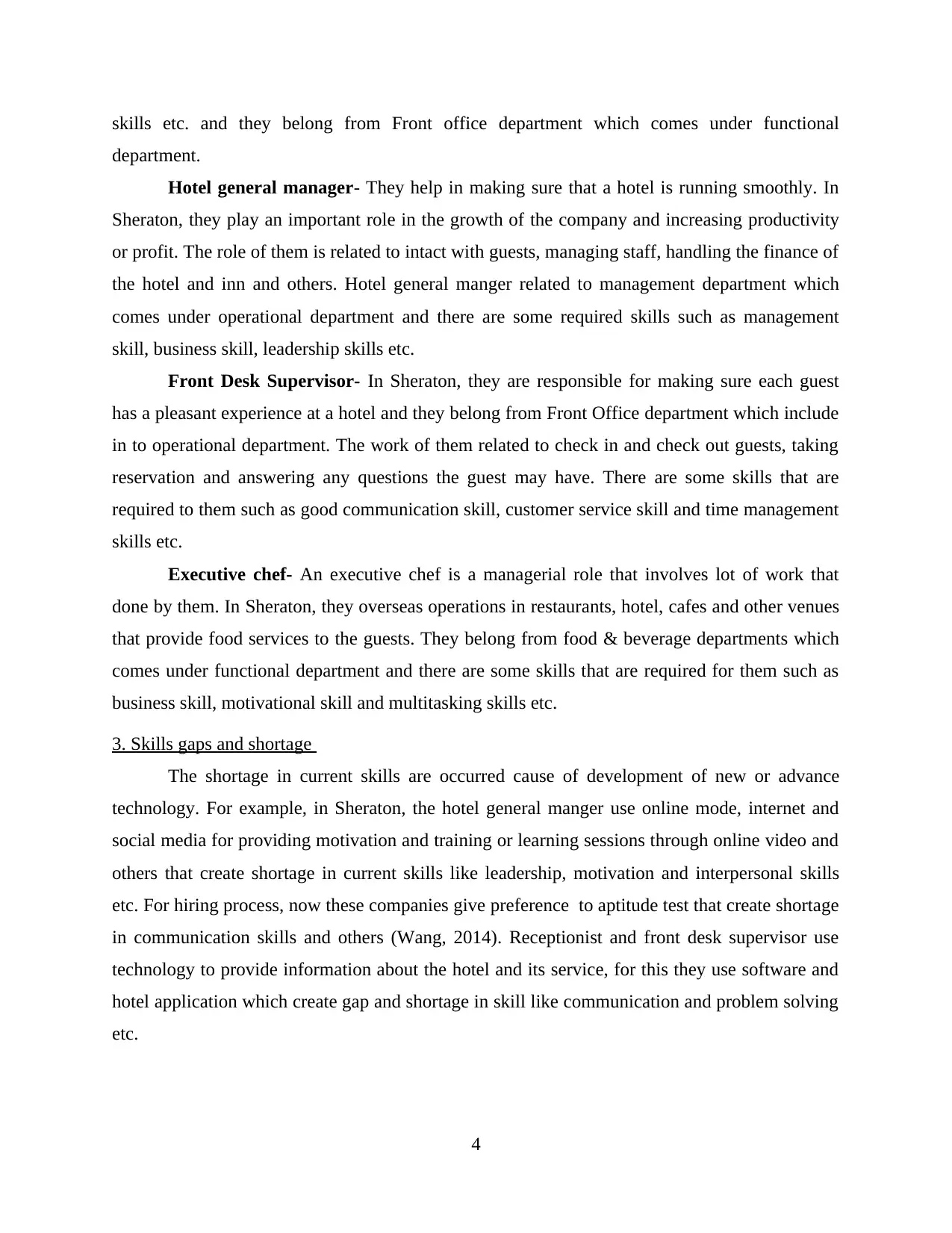
skills etc. and they belong from Front office department which comes under functional
department.
Hotel general manager- They help in making sure that a hotel is running smoothly. In
Sheraton, they play an important role in the growth of the company and increasing productivity
or profit. The role of them is related to intact with guests, managing staff, handling the finance of
the hotel and inn and others. Hotel general manger related to management department which
comes under operational department and there are some required skills such as management
skill, business skill, leadership skills etc.
Front Desk Supervisor- In Sheraton, they are responsible for making sure each guest
has a pleasant experience at a hotel and they belong from Front Office department which include
in to operational department. The work of them related to check in and check out guests, taking
reservation and answering any questions the guest may have. There are some skills that are
required to them such as good communication skill, customer service skill and time management
skills etc.
Executive chef- An executive chef is a managerial role that involves lot of work that
done by them. In Sheraton, they overseas operations in restaurants, hotel, cafes and other venues
that provide food services to the guests. They belong from food & beverage departments which
comes under functional department and there are some skills that are required for them such as
business skill, motivational skill and multitasking skills etc.
3. Skills gaps and shortage
The shortage in current skills are occurred cause of development of new or advance
technology. For example, in Sheraton, the hotel general manger use online mode, internet and
social media for providing motivation and training or learning sessions through online video and
others that create shortage in current skills like leadership, motivation and interpersonal skills
etc. For hiring process, now these companies give preference to aptitude test that create shortage
in communication skills and others (Wang, 2014). Receptionist and front desk supervisor use
technology to provide information about the hotel and its service, for this they use software and
hotel application which create gap and shortage in skill like communication and problem solving
etc.
4
department.
Hotel general manager- They help in making sure that a hotel is running smoothly. In
Sheraton, they play an important role in the growth of the company and increasing productivity
or profit. The role of them is related to intact with guests, managing staff, handling the finance of
the hotel and inn and others. Hotel general manger related to management department which
comes under operational department and there are some required skills such as management
skill, business skill, leadership skills etc.
Front Desk Supervisor- In Sheraton, they are responsible for making sure each guest
has a pleasant experience at a hotel and they belong from Front Office department which include
in to operational department. The work of them related to check in and check out guests, taking
reservation and answering any questions the guest may have. There are some skills that are
required to them such as good communication skill, customer service skill and time management
skills etc.
Executive chef- An executive chef is a managerial role that involves lot of work that
done by them. In Sheraton, they overseas operations in restaurants, hotel, cafes and other venues
that provide food services to the guests. They belong from food & beverage departments which
comes under functional department and there are some skills that are required for them such as
business skill, motivational skill and multitasking skills etc.
3. Skills gaps and shortage
The shortage in current skills are occurred cause of development of new or advance
technology. For example, in Sheraton, the hotel general manger use online mode, internet and
social media for providing motivation and training or learning sessions through online video and
others that create shortage in current skills like leadership, motivation and interpersonal skills
etc. For hiring process, now these companies give preference to aptitude test that create shortage
in communication skills and others (Wang, 2014). Receptionist and front desk supervisor use
technology to provide information about the hotel and its service, for this they use software and
hotel application which create gap and shortage in skill like communication and problem solving
etc.
4
⊘ This is a preview!⊘
Do you want full access?
Subscribe today to unlock all pages.

Trusted by 1+ million students worldwide
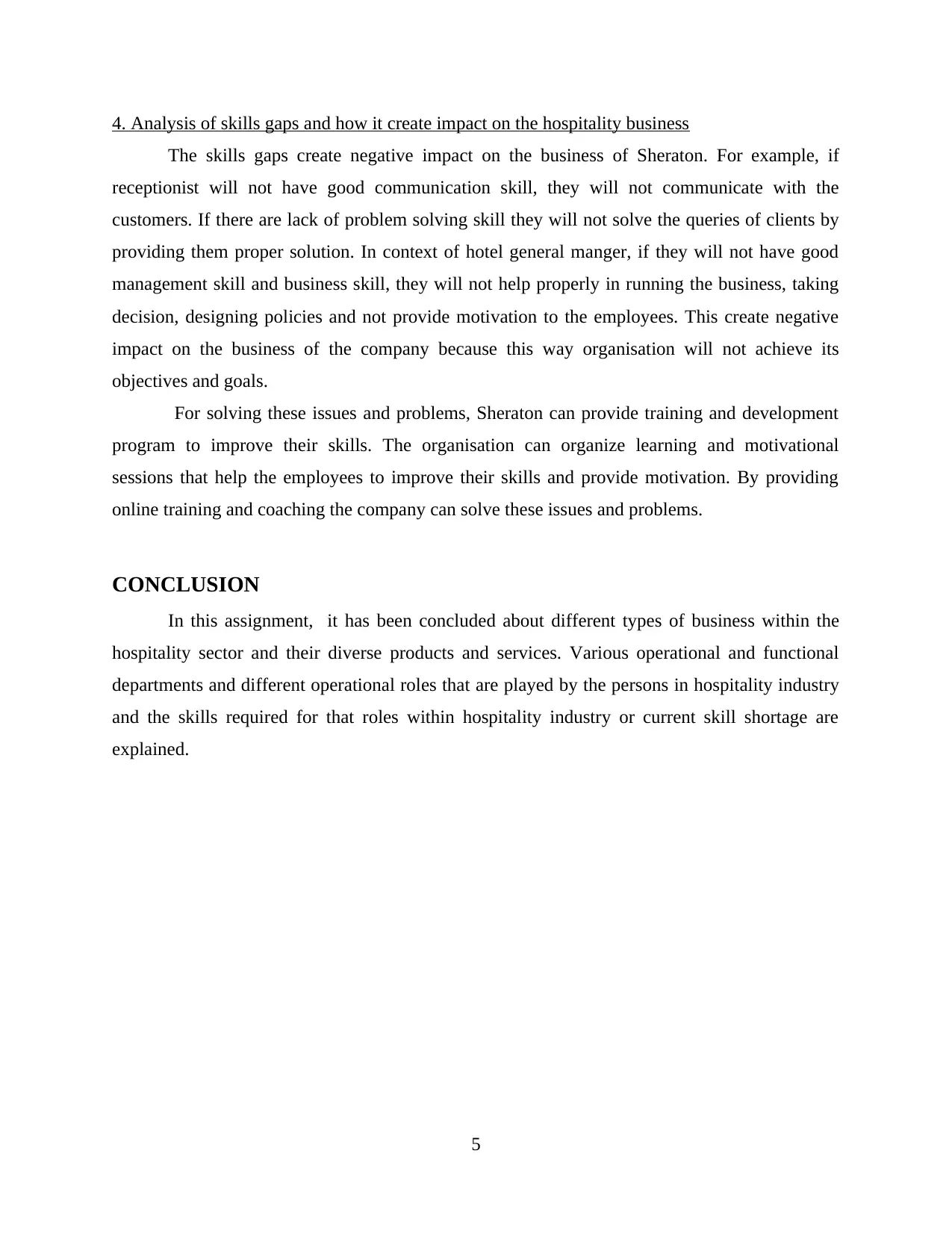
4. Analysis of skills gaps and how it create impact on the hospitality business
The skills gaps create negative impact on the business of Sheraton. For example, if
receptionist will not have good communication skill, they will not communicate with the
customers. If there are lack of problem solving skill they will not solve the queries of clients by
providing them proper solution. In context of hotel general manger, if they will not have good
management skill and business skill, they will not help properly in running the business, taking
decision, designing policies and not provide motivation to the employees. This create negative
impact on the business of the company because this way organisation will not achieve its
objectives and goals.
For solving these issues and problems, Sheraton can provide training and development
program to improve their skills. The organisation can organize learning and motivational
sessions that help the employees to improve their skills and provide motivation. By providing
online training and coaching the company can solve these issues and problems.
CONCLUSION
In this assignment, it has been concluded about different types of business within the
hospitality sector and their diverse products and services. Various operational and functional
departments and different operational roles that are played by the persons in hospitality industry
and the skills required for that roles within hospitality industry or current skill shortage are
explained.
5
The skills gaps create negative impact on the business of Sheraton. For example, if
receptionist will not have good communication skill, they will not communicate with the
customers. If there are lack of problem solving skill they will not solve the queries of clients by
providing them proper solution. In context of hotel general manger, if they will not have good
management skill and business skill, they will not help properly in running the business, taking
decision, designing policies and not provide motivation to the employees. This create negative
impact on the business of the company because this way organisation will not achieve its
objectives and goals.
For solving these issues and problems, Sheraton can provide training and development
program to improve their skills. The organisation can organize learning and motivational
sessions that help the employees to improve their skills and provide motivation. By providing
online training and coaching the company can solve these issues and problems.
CONCLUSION
In this assignment, it has been concluded about different types of business within the
hospitality sector and their diverse products and services. Various operational and functional
departments and different operational roles that are played by the persons in hospitality industry
and the skills required for that roles within hospitality industry or current skill shortage are
explained.
5
Paraphrase This Document
Need a fresh take? Get an instant paraphrase of this document with our AI Paraphraser
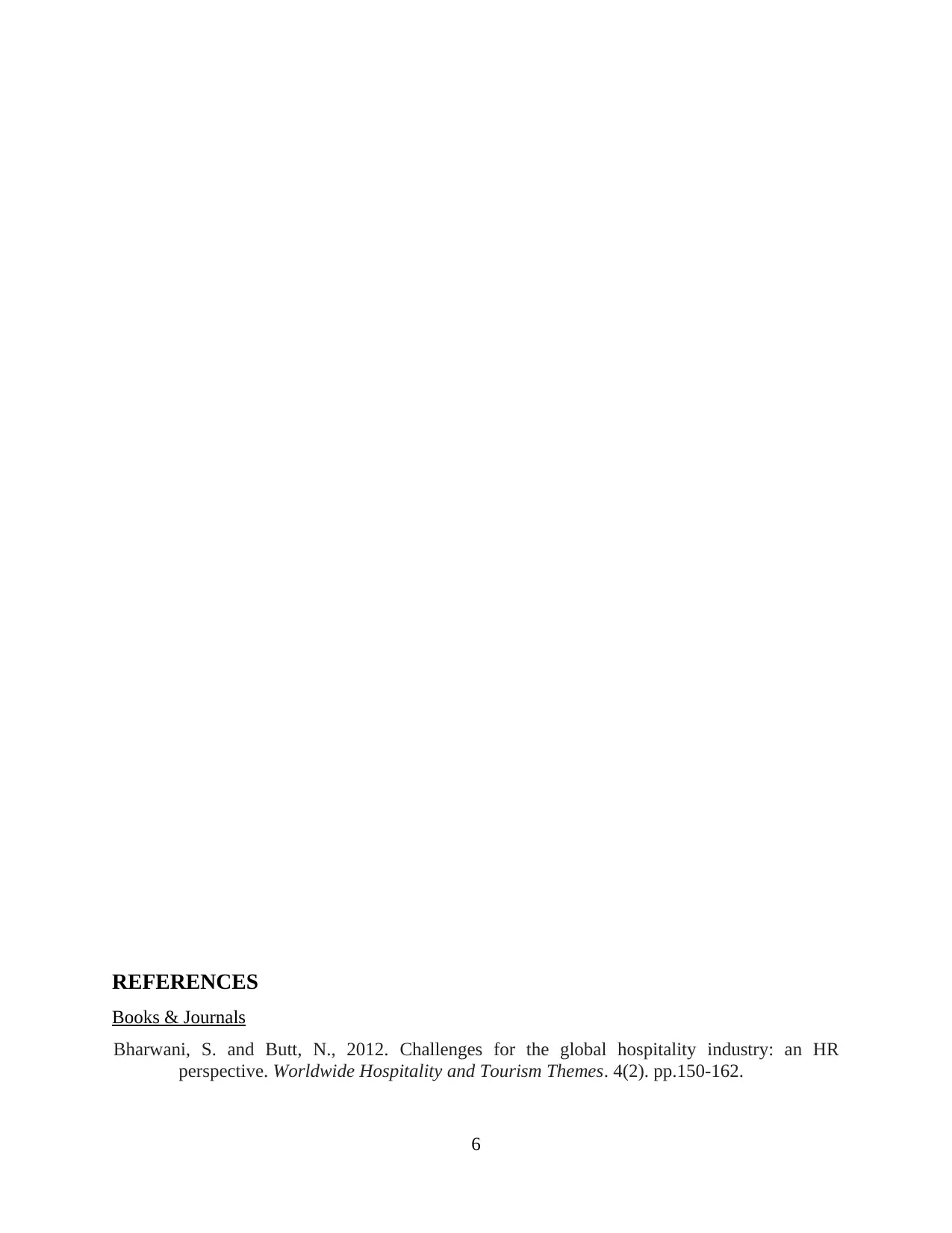
REFERENCES
Books & Journals
Bharwani, S. and Butt, N., 2012. Challenges for the global hospitality industry: an HR
perspective. Worldwide Hospitality and Tourism Themes. 4(2). pp.150-162.
6
Books & Journals
Bharwani, S. and Butt, N., 2012. Challenges for the global hospitality industry: an HR
perspective. Worldwide Hospitality and Tourism Themes. 4(2). pp.150-162.
6
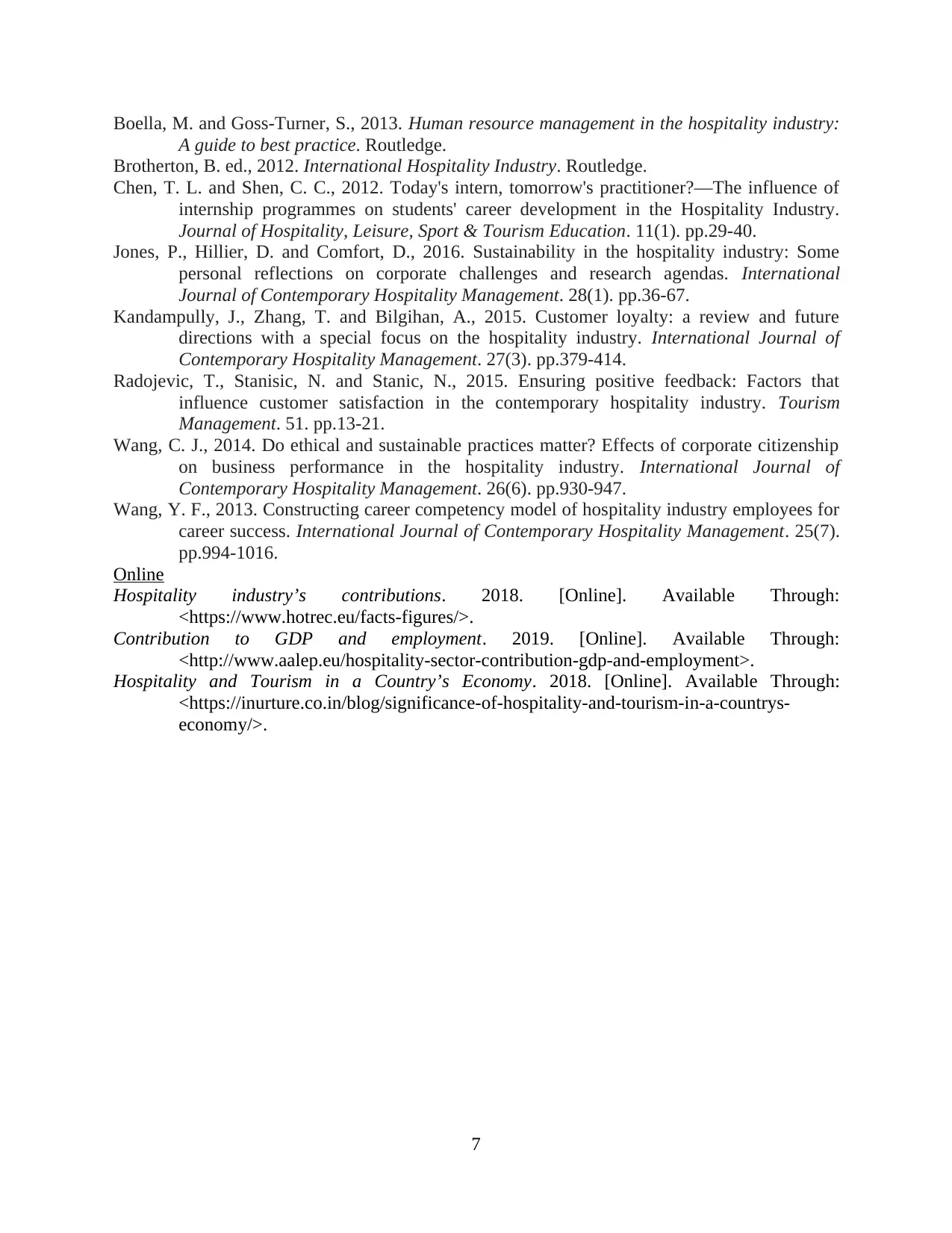
Boella, M. and Goss-Turner, S., 2013. Human resource management in the hospitality industry:
A guide to best practice. Routledge.
Brotherton, B. ed., 2012. International Hospitality Industry. Routledge.
Chen, T. L. and Shen, C. C., 2012. Today's intern, tomorrow's practitioner?—The influence of
internship programmes on students' career development in the Hospitality Industry.
Journal of Hospitality, Leisure, Sport & Tourism Education. 11(1). pp.29-40.
Jones, P., Hillier, D. and Comfort, D., 2016. Sustainability in the hospitality industry: Some
personal reflections on corporate challenges and research agendas. International
Journal of Contemporary Hospitality Management. 28(1). pp.36-67.
Kandampully, J., Zhang, T. and Bilgihan, A., 2015. Customer loyalty: a review and future
directions with a special focus on the hospitality industry. International Journal of
Contemporary Hospitality Management. 27(3). pp.379-414.
Radojevic, T., Stanisic, N. and Stanic, N., 2015. Ensuring positive feedback: Factors that
influence customer satisfaction in the contemporary hospitality industry. Tourism
Management. 51. pp.13-21.
Wang, C. J., 2014. Do ethical and sustainable practices matter? Effects of corporate citizenship
on business performance in the hospitality industry. International Journal of
Contemporary Hospitality Management. 26(6). pp.930-947.
Wang, Y. F., 2013. Constructing career competency model of hospitality industry employees for
career success. International Journal of Contemporary Hospitality Management. 25(7).
pp.994-1016.
Online
Hospitality industry’s contributions. 2018. [Online]. Available Through:
<https://www.hotrec.eu/facts-figures/>.
Contribution to GDP and employment. 2019. [Online]. Available Through:
<http://www.aalep.eu/hospitality-sector-contribution-gdp-and-employment>.
Hospitality and Tourism in a Country’s Economy. 2018. [Online]. Available Through:
<https://inurture.co.in/blog/significance-of-hospitality-and-tourism-in-a-countrys-
economy/>.
7
A guide to best practice. Routledge.
Brotherton, B. ed., 2012. International Hospitality Industry. Routledge.
Chen, T. L. and Shen, C. C., 2012. Today's intern, tomorrow's practitioner?—The influence of
internship programmes on students' career development in the Hospitality Industry.
Journal of Hospitality, Leisure, Sport & Tourism Education. 11(1). pp.29-40.
Jones, P., Hillier, D. and Comfort, D., 2016. Sustainability in the hospitality industry: Some
personal reflections on corporate challenges and research agendas. International
Journal of Contemporary Hospitality Management. 28(1). pp.36-67.
Kandampully, J., Zhang, T. and Bilgihan, A., 2015. Customer loyalty: a review and future
directions with a special focus on the hospitality industry. International Journal of
Contemporary Hospitality Management. 27(3). pp.379-414.
Radojevic, T., Stanisic, N. and Stanic, N., 2015. Ensuring positive feedback: Factors that
influence customer satisfaction in the contemporary hospitality industry. Tourism
Management. 51. pp.13-21.
Wang, C. J., 2014. Do ethical and sustainable practices matter? Effects of corporate citizenship
on business performance in the hospitality industry. International Journal of
Contemporary Hospitality Management. 26(6). pp.930-947.
Wang, Y. F., 2013. Constructing career competency model of hospitality industry employees for
career success. International Journal of Contemporary Hospitality Management. 25(7).
pp.994-1016.
Online
Hospitality industry’s contributions. 2018. [Online]. Available Through:
<https://www.hotrec.eu/facts-figures/>.
Contribution to GDP and employment. 2019. [Online]. Available Through:
<http://www.aalep.eu/hospitality-sector-contribution-gdp-and-employment>.
Hospitality and Tourism in a Country’s Economy. 2018. [Online]. Available Through:
<https://inurture.co.in/blog/significance-of-hospitality-and-tourism-in-a-countrys-
economy/>.
7
⊘ This is a preview!⊘
Do you want full access?
Subscribe today to unlock all pages.

Trusted by 1+ million students worldwide
1 out of 9
Related Documents
Your All-in-One AI-Powered Toolkit for Academic Success.
+13062052269
info@desklib.com
Available 24*7 on WhatsApp / Email
![[object Object]](/_next/static/media/star-bottom.7253800d.svg)
Unlock your academic potential
Copyright © 2020–2026 A2Z Services. All Rights Reserved. Developed and managed by ZUCOL.




